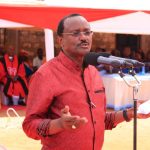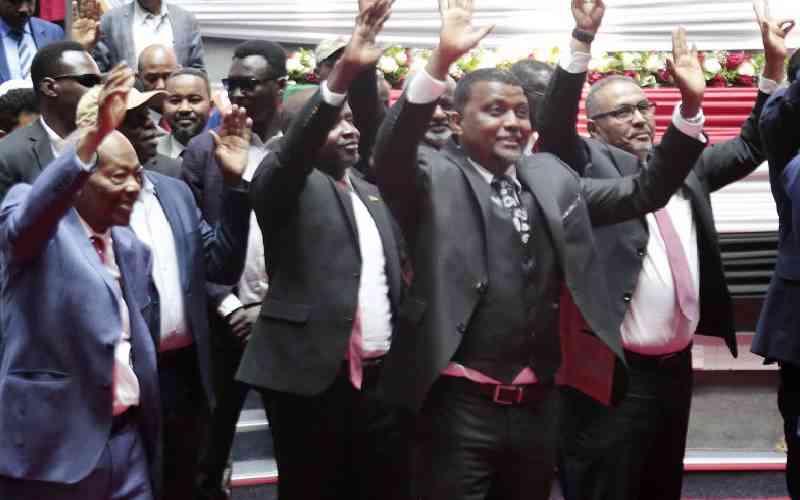Kenya’s decision to facilitate a Sudan militia group, the Rapid Support Forces (RSF), to declare the establishment a parallel government is sending shock waves in political and diplomatic circles.
Some observers have termed it unfortunate that Nairobi, which chairs the East African Community, was taking sides when the country should be playing its role of a neutral arbiter and allow the creation of an all-inclusive government in Khartoum.
By allowing RSF to sign its charter to form a government in Nairobi this week, the Kenya Kwanza administration may have committed a “reckless diplomatic blunder.”.
“It is a very dark day in terms of our political diplomacy. It is reckless and also damages Kenya’s foreign policy relationship with the US, EU, China, the Arab League and even the African Union,” says Prof Peter Kagwanja of the African Policy Institute.
On Tuesday, RSF commanders and hundreds of supporters convened at the Kenyatta International Convention Centre (KICC) to announce they would be forming a parallel government from Kenya tomorrow.
Previous administrations have hosted many rebel leaders like Yoweri Museveni, John Garang, Salva Kiir and Paul Kagame, but were never allowed to make such an audacious declaration.
Kagwanja says he was shocked when a friend called to inform him what was happening at KICC.
“It should have been done in total discreet. Wisdom is being discreet about indiscretions even if we needed to offer support, that was not the proper way of doing it.”
He argues that after Raila Odinga’s shocking defeat in the African Union Commission chairmanship elections, Kenya needed to develop a more Afrocentric, sensitive and nuanced foreign policy to avoid such debacles in future.
The country also needs to place herself in a more strategically non-controversial position when dealing with countries from all regions across the continent to regain a leading position in diplomacy.
Not long ago, Kenya managed to lobby most countries on the continent to support its cause when President Uhuru Kenyatta and his then deputy William Ruto were indicted for crimes against humanity by the International Criminal Court.
Just a decade later, it appears the country has burned many bridges, largely because of how its leadership has conducted itself when dealing with partners on sensitive foreign policy issues like the war in DRC and now Sudan.
No explanation has been given on the Tuesday event, but some pundits think it probably was because Kenya wants to force Sudan’s President, General Abdel-Fattah Al Burhan, the leader of Sudan Armed Forces (SAF), to come to the negotiating table.
That argument, however, may not make a lot of sense given that SAF is rapidly making gains on the battlefield and has so far almost recaptured the entire city of Khartoum, which had a population of about seven million before the war.
Stay informed. Subscribe to our newsletter
In June, 2023, al-Burhan opposed President Ruto‘s chairmanship of an Intergovernmental Authority on Development (Igad) mediation committee, stating that Kenya was not neutral, and was also hosting RSF leader General Mohamed Hamdan Dagalo aka Hemedti.
“Sudan rejects Kenya’s chairmanship of the Igad Committee to address the current crisis in Sudan because the Kenyan government and its senior officials have adopted RSF positions, sheltered its elements and provided them various types of support,” said Sudan’s Foreign Affairs ministry.
Relations between General Burhan and Ruto appeared to have thawed after they met at the State House, Nairobi, in November 2023 and underscored the urgent need of finding a solution for the conflict.
The two agreed to take the talks away from Jeddah where parallel discussions led by the US and Egypt were taking place, and return the process to Igad.
Last month, RSF cancelled a planned press conference in Nairobi a few hours before the event. Sources said the Kenyan government stopped it because of the potential PR disaster with Sudan and partners.
However, it now appears that was not the case.
Sources say the government feared the falling out that could have come from Sudan’s Arab country allies and some Igad partners ahead of the high-stakes AUC election held in Addis Ababa, Ethiopia, last weekend.
Sanctioning the press conference after the elections made more sense because it could have deflated attention from the government and what happened in Addis. The arrest of some politicians over the debacle, however, appears to have created an opposite effect.
The RSF meeting has now confirmed what the SAF leadership has been saying all along that its leaders, including Hemedti, enjoy unfettered access to the Nairobi State House because of his long-standing relationship with Kenyan leaders.
The statement by RSF said: “We would like to thank Kenya for hosting and facilitating this gathering. We now have a draft constitution with a transition government for Sudan supported by all the people who have founded this entity.”
Analysts argue that the deepening differences between Sudan and Kenya is hurting regional efforts to mediate and end the war as millions of people, especially women and children, endure hunger and disease in makeshift shelters.
“Recent tensions between Sudanese army leaders and the Kenyan government could hinder efforts to restore peace and stability in Sudan,” says Anwar Ibrahim Ahmed, an Ethiopian political analyst who monitors and writes about the Horn of Africa.
Kenya also finds itself in an awkward position because it is dealing with RSF leaders and generals sanctioned because of the atrocities they are committing in Sudan. Independent inquiries by human rights groups exposed killings, torture and displacement of thousands of people through alleged ethnic cleansing by the group.
An investigation by the Raoul Wallenberg Centre for Human Rights revealed that the RSF and its allied militias systematically attacked, burned and destroyed IDP sites that hosted over 80,000 people, mostly from the Masalit ethnic group, in 2023.
“They heavily shelled schools and mosques functioning as shelters for thousands of IDPs with artillery and mortar, and destroyed all medical facilities,” said the report.
The UN Special Adviser on the Prevention of Genocide also sounded the alarm on the level of genocide that has taken place since October, 2023, saying victims targeted were from the Masalit, Fur, Zaghawa, Bargo, Tunjor, and other non-Arab tribes in the West, South, North, East, and Central Darfur States.
Sudan recalled its ambassador to Kenya last year as it protested Ruto‘s hosting of talks with Hemedti, who apart from Kenya, has also visited Uganda, Ethiopia and Djibouti as well as South Africa.
Professor of history and international relations, Macharia Munene, says it was not surprising that the Igad talks led by Ruto have failed to yield much, noting that it is a weak organisation that also depends on outside help to meet its financial obligations.
“It is divided because Sudan has raised issues with the leadership of the peace-making organ, but it also appears as if these concerns were not heeded and that has complicated matters,” says Macharia.
Sudan has condemned Kenya, saying hosting “a terrorist militia” while they continue committing genocide and ethnic cleansing was a betrayal to African solidarity, and also dismissed the Nairobi RSF meeting as a propaganda stunt.
It accused Kenya of attempting to aid in the dismembering of African states by allowing RSF to constitute a parallel government, adding that the country is now also complicit in crimes against humanity.
The statement also accused Kenya of breaking the UN charter, the AU Constitutive Act and the Genocide Convention.
Kenya was elected to chair the Igad talks on June 12, 2023, in Djibouti. Other countries in the talks are Sudan, South Sudan and Ethiopia.
Analysts now warn that the widening rift with Sudan could scatter the diplomatic efforts, while other players like Egypt and Ethiopia who also have their own interests in Sudan could also defy Kenya’s position.
President Ruto’s administration is likely to be in the diplomatic spotlight as questions are raised on Kenya’s foreign policy and it’s role in regional stability.
Kagwanja says it is difficult to understand Ruto’s motivation in siding with RSF given that countries like the US decided to sanction their leaders, which also puts our country at loggerheads with its Western partners.









